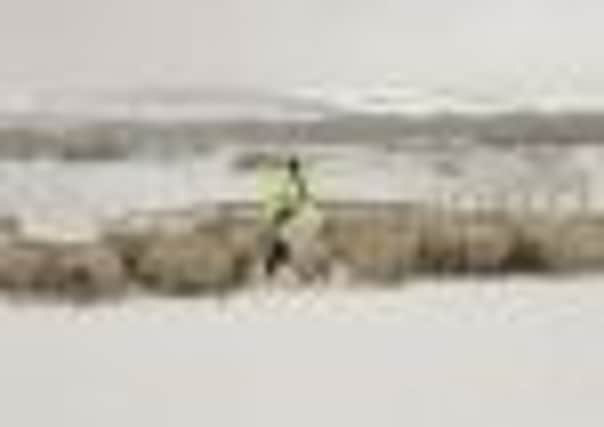Weather: Farmers losing upto 20% of newborn lambs


An “unprecedented” number of deaths has been reported as the scale of the losses begins to become clear.
Livestock farmers are working round the clock as they try to beat the weather, which could have severe financial implications on them for the second year running.
Advertisement
Hide AdAdvertisement
Hide AdThe National Farmers’ Union of Scotland (NFU) said the industry had sunk into a state of depression – while weather chiefs warned there was no end in sight as they refused to rule out snowfalls for the next month.
Nina Clancy, Lothian and Borders regional manager for the NFU, said: “This has been a long stretch of extremely bad weather. There are a lot of farmers who are really down and quite depressed.
“Can you imagine walking around and picking up dozens of dead lambs in the morning?
“The worst thing for farmers is that this follows an absolutely dreadful year last year. Everybody was hoping this spring would be good, and we’d have grass available.
“The cost of seed, fertiliser and fuel is huge. Some farmers are facing real financial difficulties. Livestock farmers are working through every hour of daylight, and crop farmers are not able to get on to the land at all in some cases. Everything is delayed and it’s going to impact heavily on this coming year’s harvest, which means two bad harvests on the trot.”
Ms Clancy estimated that some farmers in the Lothians had lost huge proportions of their lamb population – up to 20 per cent in some cases.
She said: “Sleety, wet, cold snow, will kill lambs very quickly. Unless farmers have internal shelter for their lambs, they’re experiencing really horrendous losses.
“Even at farms where lambing hasn’t fully started yet, they have heavily pregnant ewes and the difficulty is getting feed out to them.
Advertisement
Hide AdAdvertisement
Hide Ad“Farmers in the Pentland Hills are just about to lamb, and they’re suffering large livestock losses.”
One farmer said that the freeze was affecting other animals too.
Iain Orr, who farms cattle in West Lothian, said: “The snow is a killer. Lambs and ewes are most at risk of dying, either from the cold and snow or because the cold weather ensures the grass doesn’t grow. Sheep have to be fed from buffers, which increases our costs dramatically.”
Mr Orr described his 110 cows as being “not in nearly as good condition as they should be” because they had been kept inside too long.
Support services for the agricultural industry said the weather was affecting the mental health of livestock farmers. Dr Maurice Hankey, chief executive of the Royal Scottish Agricultural Benevolent Institution (RSABI), a charity which offers counselling and advice to struggling farmers, said: “In most years the seasons and weather patterns allow farmers to get on with their work, sometimes early, sometimes late, but over the past 12 months this has all gone to pieces.
“Across the Lothians we have seen a wet summer spoiling hay and silage crops, then wreaking havoc with harvest and autumn drilling. Livestock have been housed for longer than anticipated, increasing costs.
“At this time of year, crop farmers are anxious to get crops drilled and planted, and livestock farmers are busy with lambing and calving, all now disrupted by prolonged snow and cold weather.
“When combined, this amounts to a perfect storm of increased costs and reduced incomes, let alone the psychological impact.”
Advertisement
Hide AdAdvertisement
Hide AdThe Met Office said there was no good news on the horizon, warning that the snow will continue to fall over the weekend and possibly throughout April.
Dr Hankey urged farmers struggling to cope contact the RSABI for support. He said: “We have an ability to help farmers through some of these difficulties, offering both our GATEPOST listening service (03001114166) and help with household expenses for those unable to provide for their families.”